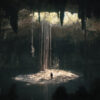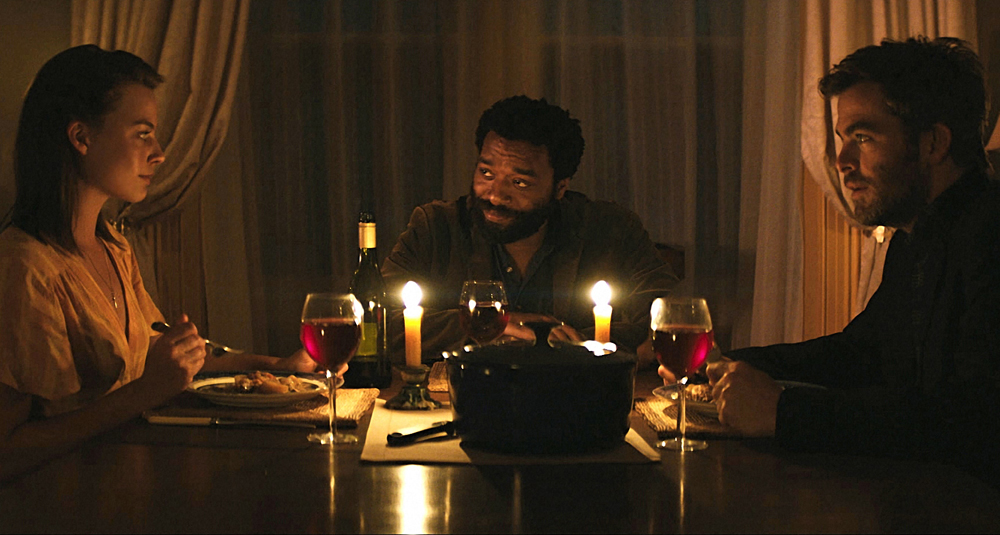When Ann Burden, the lead character of Craig Zobel’s latest film “Z for Zachariah,” sits down at the pipe organ in what’s left of a local church in the wake of an apocalyptic event, it sends shivers down the spine as she plays the first few notes of a hymn. Something soulful with great integrity yet unfamiliar and unexpectedly modern, it is the kind of sound that one has come to expect from the musician who created it – Heather McIntosh, who first collaborated with Zobel on the 2014 psychological thriller “Compliance” and has gone onto become one of cinema’s most distinctive composers.
For those who knew of McIntosh’s work before scoring films, this shouldn’t come as a surprise. After all, it isn’t all cellists who are asked to tour with the likes of Lil Wayne and Gnarls Barkley. But McIntosh’s subversion of string instruments, so often restricted to service the classics, has resulted in a series of bold and unforgettable soundtracks for such films as Leigh Janiak’s “Honeymoon” and Riley Stearns’ “Faults.” The timelessness still exists, only McIntosh has reconfigured the rich textures associated with the oldest of musical instruments with mad scientist-like experimentation and imagination to make every note feel so sharp and cutting edge, it bleeds.
With “Z for Zachariah,” McIntosh is given the challenge of creating musical accompaniment as vast and grand as the land Ann (Margot Robbie) and her fellow survivors (Chiwetel Ejiofor and Chris Pine) try to make a new life off of while tending to the complex, small-scale struggle that develops between them as the threat to their collective survival comes not from external forces but rather emotional torment within. It moves seamlessly from the epic to the intimate, in no small part to McIntosh’s score and shortly before the film hits theaters, she spoke about her ongoing collaboration with director Craig Zobel, her path to film composing and the transcontinental hunt for pipe organs to get the perfect pitch for “Z for Zachariah.”

I use to live in Athens, Georgia and we actually have mutual friends from there. I’d seen “Great World of Sound” before “Compliance” and I’m also a fan of Homestarrunner, so I knew his work from very early days. He went to high school with one of the original drummers for of Montreal and I played cello with them for awhile. We’re just a bunch of friends in a college town, basically.
We became close when I moved to New York City and we started talking about film more specifically. While I was in school for composition and playing in bands, I worked at the local video store. I love film and I would even go back to work after being on tour with some the more bonkers musicians I’ve toured with like Lil Wayne, so I could get my fix. Craig and I just always had a dialogue about films that we liked and my band did the music for a documentary called “Examined Life” that came out before “Compliance, and he knew I wanted to do film stuff. We were actually going to work on a different film, but it didn’t happen and then at the last minute, he was like, “Hey, we got funding for this! Do you want to do this film about this fast food restaurant?” I was like, “Yes.” [laughs] We’ve just been long, longtime friends and then just sort of developed this other language of putting music to film.
As a cellist, I imagine you’re obligated more often than not to play classical music and yet your compositions feel so modern. Has film given you a chance to break away in that respect?
It’s interesting because when I was in high school, I first started going to arthouse theaters but also started listening to more 20th century composers – George Crumb and some of the minimalists. Some of that stuff is so cinematic and interesting, you could see filmmakers like Kubrick going in that voice on film. I loved how even in horror films, you can get really experimental. Even as as a younger person, I had no idea how I was going to and at that point, I was struggling to play classical, not because I wasn’t good – I still play cello in all mediums – but when I was younger, playing live was so stressful because I always wanted to live up to the expectation of the dead classical composer.
Then something just clicked when I got to college. I started playing in a punk rock band with bass, but then switched from doing jazz and punk rock stuff into more of an indie rock cello player, for lack of a better word. Along with working at the video store, I just thought, I would love to be able to do film music, but I lived in Athens, Georgia, so I had no idea how to make that connective tissue. I was going on tour with bands and then all of a sudden , I started being aware of the film scene at the North Carolina School of the Arts – Craig and David Gordon Green and I was like, “Those are my peers over there.” You started to see how they developed their voice as artists the same way that my indie rock friends were developing their voice, which was super exciting to me.
When I first saw “George Washington,” I was like, “Holy cow! That’s one of my people making a movie.” I didn’t know him at that point, but this whole world unfolded in the same way [as it would for a musician] – you’ve got to South by Southwest to play with bands. Now, it’s like that with Sundance and all the other film festivals. Somehow in there, I realized there was a potential there.

I got the script maybe two years ago, though it might have even been longer than that. I’ve been thinking about this for a long time. With “Compliance,” we knew it was one big theme and a lot of variations. This one felt like we needed to sound bigger, like more orchestral – not that “Compliance” doesn’t sound big, but we knew it needed to fill that space of the valley and the setting of the film. It’s not like you’re in the back of a fast food restaurant. You need to be orchestral and stretch out a little bit.
Thematically, Craig was really interested in pulling different themes for the different characters. Also, we knew that the organ was going to be a big part of it. We were going to have to figure out how to develop a theme that made sense for Ann [Burden, the character played by Margot Robbie] would play but it’s also serving a function in the story. It’s not just like she’s playing a hymn out of a book that’s dusty and old. It had to be something that had a little bit more yearning or [said] a little bit more about her character. I wrote some Protestant-sounding numbers early on, just trying to find the right pump organ tone for it and it was a lot of exploration because I had a lot of time to develop the score.
I’ve actually heard you went all around the country looking for the right pump organ.
[laughs] Yeah, I actually had a composer friend who lived in Ashville, North Carolina and he’s got a pump organ in his studio there, which I used quite a bit. Then it was more like textural stuff. We recorded the theme and whatnot, but then I wound up going to Portland, Oregon to [visit] Mark Orton, who did the score for “Nebraska” and he had a really great one. It has really good pitch and a really beautiful tone, so we messed around with that.Then at Sundance two years ago, I got this wild hair like, “I’m going to New Zealand. I’m going to record the organ in the chapel.” So I went there also [because] it was really important for me to physically be in the space where the film was shot. It’s a beautiful remote part of the country over there. It’s 45 minutes to the nearest gas station. At that point, I had the main theme written, but nothing was really locked in beyond that and it really helped me grasp the space of the film. It’s unusual, I think, for a filmmaker to bring on a composer so early during the shooting of the film, but I loved it. I also went on the set for “Compliance,” which was great. If given the chance, I’ll go.
There’s a moment early on in the film where the buzz of snakes and other nerve-wracking elements of nature seem to commingle with the score you’ve created. Of course, some of that is sound design, which is another department, but do you actually have any input?
It’s cool because we actually had some early meetings with the wonderful Rich Bologna, who worked on “Compliance” as well. He is amazing and we are dear friends. I’m one of those composers that loves sound design. A lot of composers fight it because it’s like, “Where did my music go?” But I come from a really strong electronic composition background. I love exploring ambient sounds and messing with them and I find that those more concrete sounds are just as valuable and interesting as anything else, so we would do these pow wows [where] we would both write for a scene and sometimes the score would disappear. We talked a lot about that, like, “This is going to be a score moment and this is going to be a more sound design moment. This is where we’re going to let the natural base take over.” And I love it when we’re all on the same page.
They have a film music lab at Sundance that they started doing at Skywalker [Sound] and the first time I ever went to Skywalker was with “Compliance.” We were able to mix there and it great to get to go back there and learn [from] people who really believe in the importance of storytelling through sound itself and how the score high fives the sound design. If you can really hit that symbiosis, it’s way more compelling in the storytelling department.
You talk about tweaking ambient sounds in your music, but I’m just as curious about your ability to manipulate the instruments you play – there’s always an elegance there that’s to be expected of string instruments, but also often an unsettling feeling that what you’re hearing may not be in its purest form, which works really well for the thrillers you’ve worked on. How did you discover what you could in that respect?
It’s definitely part of my bag of tricks. I love all of those 20th century composers like Stockhausen and Varèse and I love to use organic sounds in different ways. If you were to look at a [recording] session of mine, a lot of times you’ll see the score stuff, but then you’ll see the guts — the little underlying tension things. I work in a concrete music kind of way, where my ProTool sessions look almost more like sound design. I’m still writing in a conventional, compositional way where it’s like “Here’s the violins, here’s the violas, here’s the cello and bass” but there needs to be that tension. [In “Z for Zachariah,”] it is a beautiful, bucolic place, but these are the last folks on earth. The stakes are higher and there’s a lot of inner dialogue going on.
With “Compliance,” none of that was to click [initially]. Since I hadn’t written film music before, I was just writing the way I knew how, so I wasn’t using sample libraries in the same way that a lot of composers do. For that first score, I did a rhythm session. We did a bunch of different tempos, then I did a lot of cut and pasting hoping to have the parts that fit the picture. I wrote the way that made sense to me at the time, and even though I may have been doing a little bit more electronic manipulation of these organic sounds, at the end of the day because there isn’t this locked-in tempo the whole time, the sense in your ear when you listen to it is a little bit different. It feels like it can breathe a little bit more and if I can get that feeling with any of my scores, I feel like I’m in a good place.

Having two years, you have a lot of time to accentuate the tone for a project. At the end of the day, we felt like we needed to be Ann’s journey and she’s holding on pretty well. Working on it for such a long time, you’re familiar with the base material, so I wanted to make sure that there was organ and then it could build, and build, and build. I had a lot of different kinds of organs and I ended up having to pull away from my initial parameters [for the score]. I got really excited about some of the parameters like, “We’re going to use a pipe organ the whole damn time.” But at the end of the day, it didn’t fit the intimacy of earlier parts of the picture. That actually disappeared quite a bit and ended up being more about that little tiny organic-type organ most of the time.
It’s interesting. My initial inclination with the film was to go more avant garde and darker, and it was really exciting to see in the collaborative film process that sometimes things can grow and get bigger and still have that experimental element, but sometimes with time you realize you need to dial that back. You want people to be on board, so my avant garde style started to find the setting in there and hopefully, it started to bring the audience along also. That tension stuff ended up being a much smaller part, but there’s something really compelling about having those little tiny tense sounds that grow toward the end of the film after having been so microscopic at the beginning. If they start super small, they can be equally as effective as something smacking you over the head.
“Z for Zachariah” opens in theaters and is available on iTunes and VOD on August 28th. Heather McIntosh’s soundtrack for the film can be found on iTunes.





Comments 2